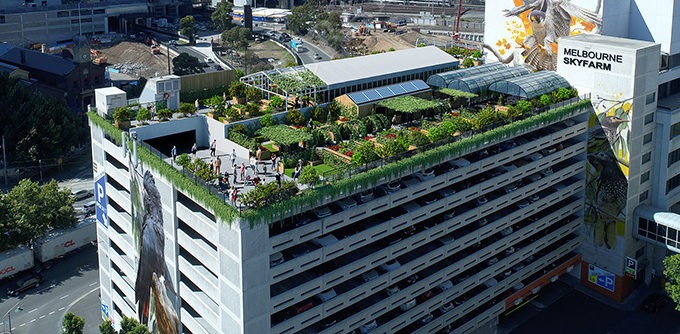Garden city: the age of urban farming
Melbourne is likely to overtake Sydney as Australia’s most populous city over the next few years. The coastal capital is already home to around five million people, and the Victorian state government estimates that this will grow to nine million by 2056. That’s a lot of mouths to feed. But while our city populations are growing, our regional areas – where most of our food is grown – are shrinking. So where is all the extra food we need going to come from? One answer lies in our cities themselves: urban farming.
While Melbourne is probably best known for its coffee, hipsters and laneway culture, the thriving capital is also making a name for itself as an urban farming stronghold. Rooftops, car parks, median strips, courtyards and schools are being transformed into urban farms that can produce surprisingly large amounts of nutritious, hyper-local food.
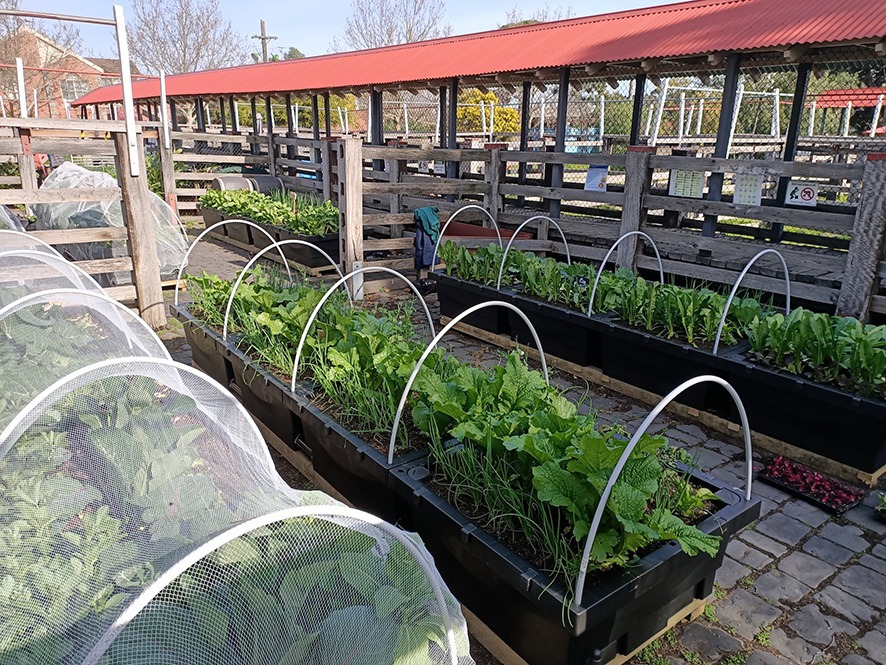
We’re here to grow food
Kensington Stockyard Food Garden, located just a few kilometres from Melbourne’s CBD, was established in 2018 thanks to funding from the City of Melbourne and support from local businesses. The member-based garden is free to join and grows fresh produce for community groups, including local food charity Moving Feast. It began as a pilot project to see if a community garden was a viable prospect in the area. Short answer: it was.
“The City of Melbourne wanted to see whether there was enough community response to keep the garden going,” says Nina Ceddia, garden committee president and founding volunteer. “Within the first 12 months, we had already met their entire two-year expectation. Plus, we had listed ourselves as a not-for-profit organisation.
“We increased our membership from 20 members to 130 members. I had to close off registrations last month because our growing capacity had reached its limits.”
Ceddia stresses that this is no hobby garden. The main goal of Kensington Stockyard Food Garden is food production, pure and simple.
“We’re not a garden where you plant things to see what it does or how it looks,” she says. “We’re in it for growing food, growing organic and growing volume.”
The garden produces everything from herbs and salad greens to vegetables of all types. It utilises wicking garden beds, including 40 wicking bed modular urban farming systems called Foodcubes. These are made by Melbourne-based urban farming company Biofilta.
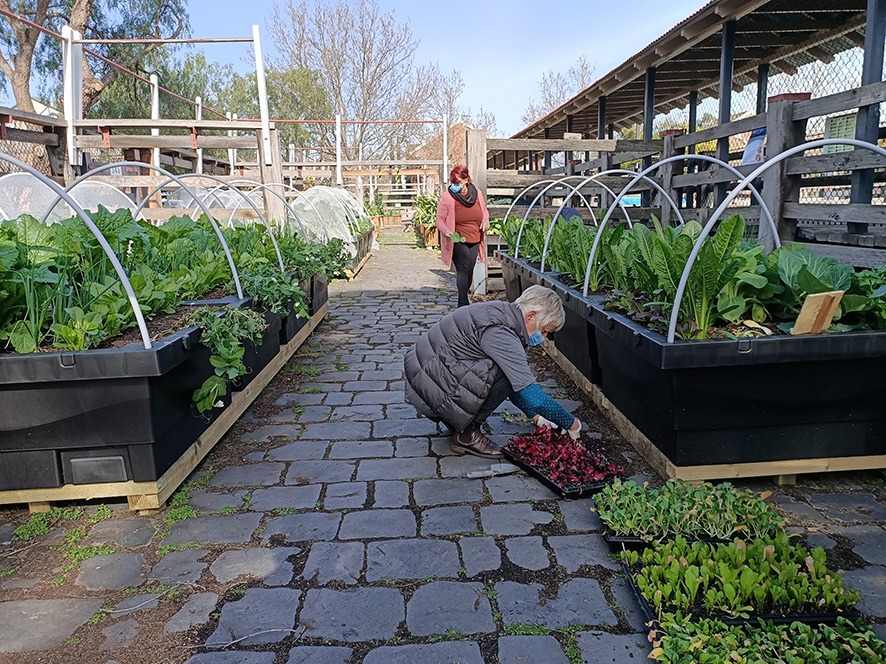
The ultimate (food) security system
Biofilta’s self-watering, lined and sealed garden beds are made from recycled plastic and have a reservoir of water in the base. This means plants can access water at all times. The beds can also be interconnected, which makes watering a large number of them a breeze. You just stick the hose in, turn it on and walk away while the reservoirs fill up.
Because the plants reach downwards for water in the reservoir, the only water loss is through foliage. There’s no need to top-water, which also means that weeds are not a problem, because the dry soil surface prevents weed growth. The raised beds also eliminate the need for excessive kneeling and bending when tending plants.
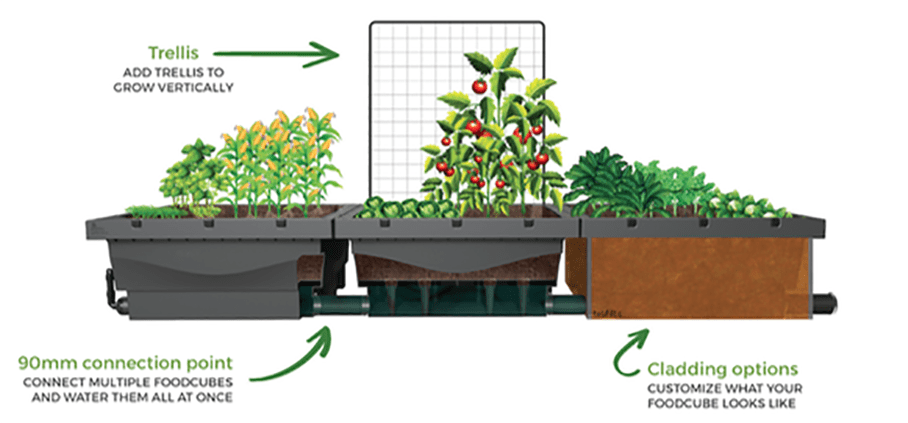
Seeing the city in new light
Biofilta Director Brendan Condon says the company spent the past eight years developing its modular farming system to help cities and householders become more food secure. It can also help them deal with rising food prices, climate change, drought and other unexpected events where local food production becomes especially important.
“What we developed is water-efficient, low maintenance, really productive, simple to use food growing architecture that allows us to look at cities through a different lens,” Condon says. “Because if you look at cities through a horticultural lens, we have all the ingredients to be able to generate huge amounts of food. We have lots of rainwater runoff from rooftops. We also have huge amounts of food waste. This could be composted back into the soil and back into food production. And we also have plenty of space.
“Cities have enormous potential to grow substantial quantities of produce within city limits, and within arm’s length of where people live. So really, we’re trying to turn cities into food powerhouses by putting in the right food-growing systems.”
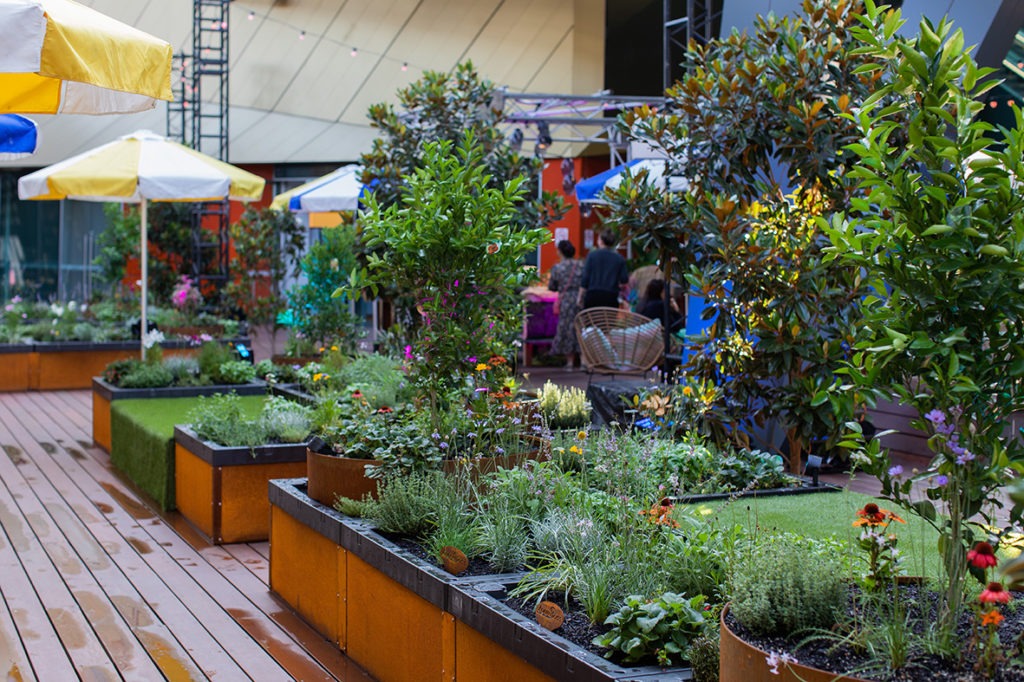
Reaching for the sky
Biofilta’s system has also been set up in an edible garden at the Melbourne Convention and Exhibition Centre (MCEC). Thirty-six Foodcubes grow herbs and citrus trees that provide food for the Goldfields Cafe on site.
“It’s a really good solution,” says Sam Ferrier, MCEC Sustainability Manager. “Particularly for city venues like ours where we’re relatively indoors with not much open space. It’s a nice setting for events, and obviously, it’s an education piece as well.”
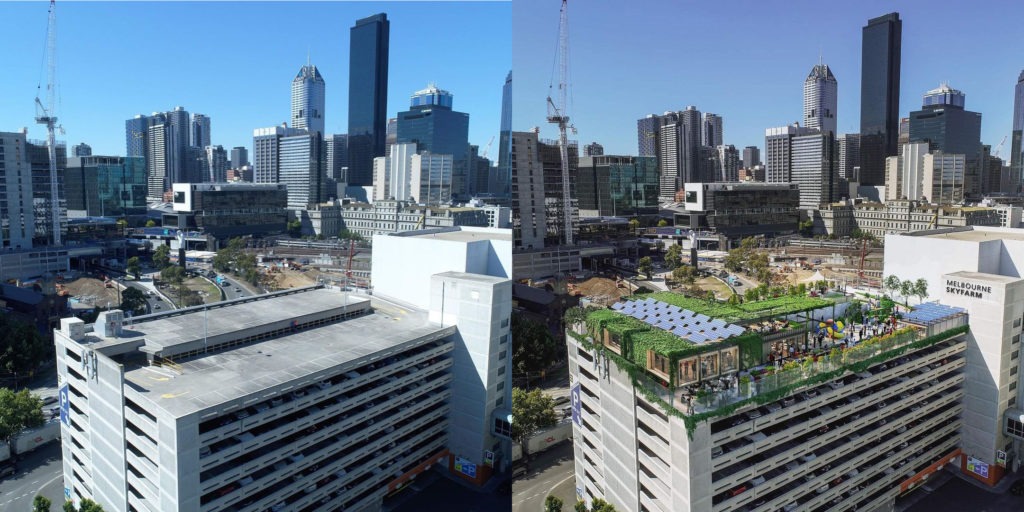
City meets country
The rooftop of the MCEC’s Siddeley Street car park is also being transformed into “Melbourne Skyfarm”. This 2000sqm space is being developed to become an urban farm, cafe and education centre. Condon, one of Skyfarm’s directors, originally approached the MCEC to see if they might be interested in the idea.
“We were really keen to pursue it,” Ferrier says. “It aligns closely with our own values in terms of local food production and supplementing our menu.”
Skyfarm visitors can tour the farm and orchard. You can sample honey from working beehives, eat at the cafe, have a drink on the deck, hire event spaces, attend classes at the environmental education centre or just enjoy the kids’ playground. Essentially, it’s a little piece of the country right in the heart of Melbourne’s CBD.
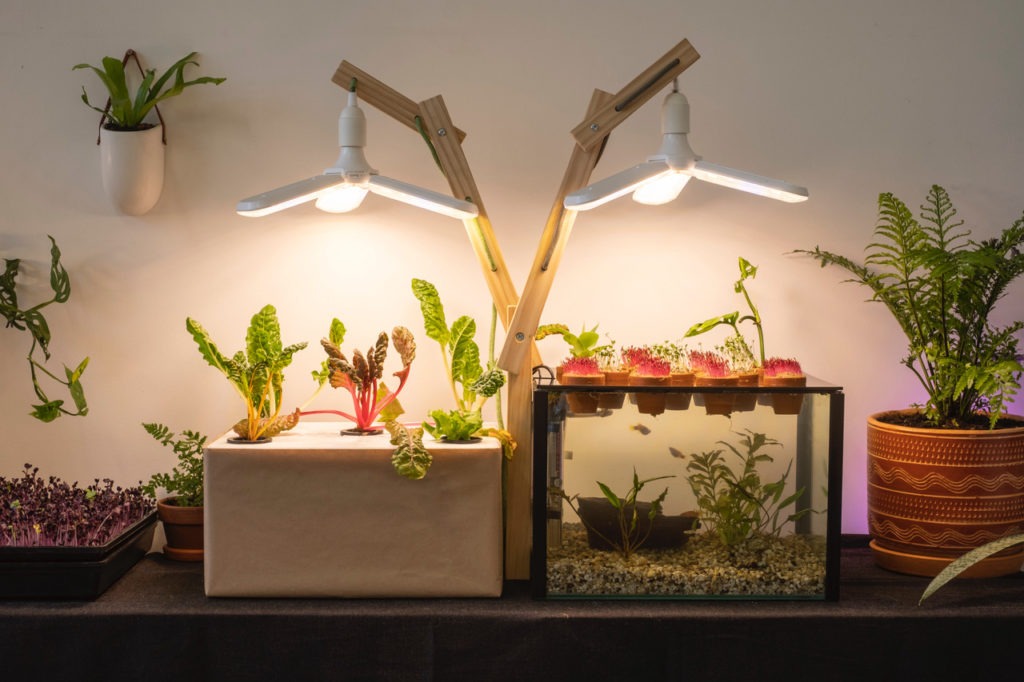
Welcome to my virtual garden
Also located physically in Melbourne, but reaching much further thanks to the internet, is Farmwall. They design sustainable products, technologies and experiences that allow people to embrace food production, no matter where they live.
As well as selling grow kits that can produce food in the smallest unit, Farmwall also has an online platform. Ecosytem by Farmwall has created a virtual community garden made up of legions of passionate urban food producers who want to learn, grow and share knowledge.
“We’re taking people on a journey where they feel empowered,” says Farmwall CEO Geert Hendrix. “They feel like they can actually make a difference.”
Whether you have access to a local community garden or not, you can participate in urban agriculture through Farmwall. As well as giving members access to nutritious, locally-grown food, there are also the social and psychological benefits that come with belonging to a thriving, productive community.
““In urban farming, there’s a lot of potential to bring value to people; not only from learning how to connect, but also how to grow your own healthy food,” Hendrix says.
“when you’re connecting with urban growing on a daily basis, your stress levels drop and your mood increases. We’ve done multiple tests to prove it.”
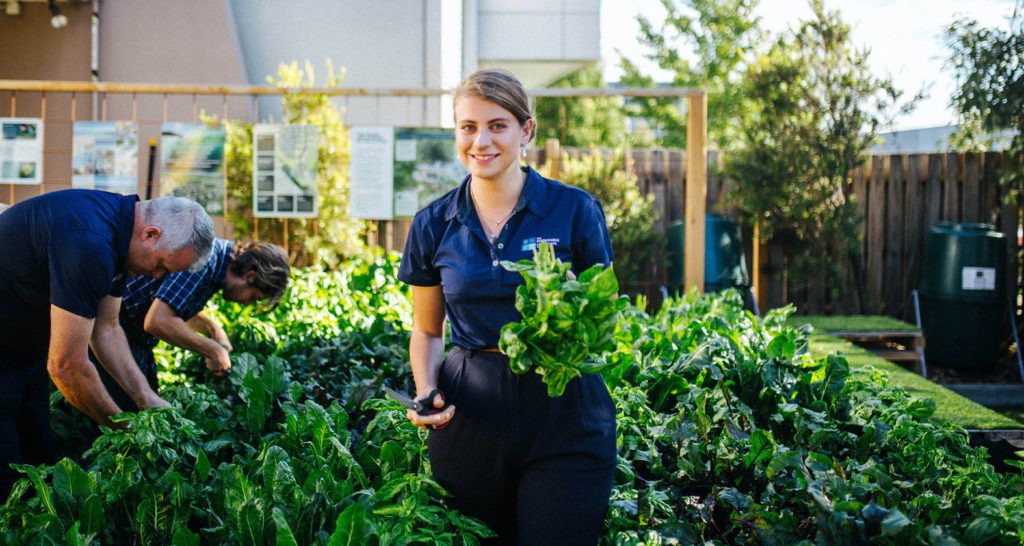
The seed has been planted
An online community such as Farmwall’s could provide a solution to potential future urban farming endeavours in cities around Australia. Encouraging city councils and developers to hand over part of their land for food production will be a lot easier if there’s already an army of skilled gardeners at hand, ready and waiting to be deployed. And with systems like Biofilta’s – which can be set up and ready to grow in a day – the preparation, planning and labour required to get an urban farm off the ground are also minimal.
“We have to become better at producing food,” Condon says. “We have food security challenges with climate change; we’re building over a lot of our food bowls. We need to turn it around. Cities can become productive farms. We have the systems to do that now.”
This rise in urban farming is seeing many Australians rediscover something that was once common in our grandparents’ day; something that slowly began to disappear with the onset of expanding cities and increasing industrialisation. It’s the joys of growing your own food.
“People are starting to understand that growing our own food offers many benefits for our lives,” Hendrix says. “Not just from a food security perspective; also how it benefits our bodies and minds. It’s a feeling of being part of something much bigger than ourselves.”


